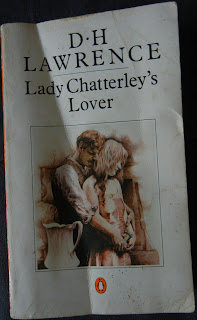Lady Chatterley's Lover
It was my grandfather's interest in the Lady Chatterley trial that first brought my attention to Lady Chatterley's Lover by D. H. Lawrence. I was, at the time, too young to even consider reading the novel (I must've been fourteen or fifteen), but, after a bit of research, I was able to ascertain the story and why it was so controversial.
The novel concerns the notorious relationship between a lady of the aristocracy and the game-keeper of her invalid husband's grounds. Says it all? Most of the novel explores the necessity/desire for a physical relationship that Lady Chatterley, a young woman, longs for, now that her husband has been paralysed waist down in the First World War. Truth is, he is the one that pushes her towards it because he wants an heir, a boy, to carry on the Chatterley name and take care of Wragby, the family seat.
There is the tone of class distinction, how Lady Chatterley, Connie, is rather sympathetic towards the lower classes but her husband, Sir Clifford, isn't. He believes that somebody should be the boss and justifies his impersonal way of running his estate with the fact that he was born to be boss.
Connie, however, has grown up rather exposed to the world. Her sister, Hilda, and she were left to their own design before Connie fell in love with Sir Clifford. She has just a month of 'proper marriage' before she is resigned to the role of care-giver and nurse to her husband. She accepts this life quite easily, not really giving thought to what she was missing out on. Pushed to the edge of frustration of being locked in and, in essence, being a mechanical servant, Connie finds her peace in the woods that surround Wragby, and in the arms of Oliver Mellors, the crude, classless game-keeper.
I must admit that I found a lot of the book rather revolting and did skip quite a few pages, but I got through it somehow without any doubt in mind as to why it was such a big deal when it first came out!
Some of the characters just annoyed me. A lot of it seemed impersonal. But Lawrence was, when the book came out, trying to prove a point, and I believe he did!
I suppose I admire Connie's initial reluctance and her reaction to the realization that she was bound by Sir Clifford in the most unjust manner - he doesn't what's wrong in having her nurse him, being rather selfish and running after his mistress, Success, through his writing. It makes you want to clobber Sir Clifford over the head a few times and shake him awake. Mellors doesn't change over the course of the book, but he genuinely loves Connie. Enough to know when he must take his leave of Wragby in order to preserve her image as Sir Clifford's wife.
I suppose I admire Connie's initial reluctance and her reaction to the realization that she was bound by Sir Clifford in the most unjust manner - he doesn't what's wrong in having her nurse him, being rather selfish and running after his mistress, Success, through his writing. It makes you want to clobber Sir Clifford over the head a few times and shake him awake. Mellors doesn't change over the course of the book, but he genuinely loves Connie. Enough to know when he must take his leave of Wragby in order to preserve her image as Sir Clifford's wife.
I wouldn't necessarily recommend this book, but would love to take a look at the case files, just as my granddad did, to know what the line of defense for its publication was.



Comments
Post a Comment